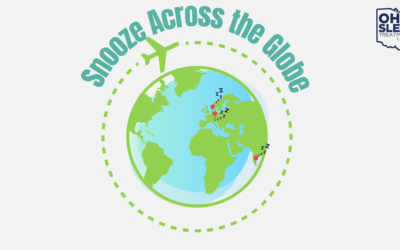-
Pingback: Snooze Across the Globe: Travel Destinations for Better Sleep
How to Reduce Jet Lag When Traveling
Summer is here and peak travel season has begun. While many of us enjoy visiting new places, long-distance travel resulting in jet lag can alter our circadian rhythm affecting our sleep quality. Jet lag, or extreme tiredness from changing time zones, can dysregulate your body’s natural internal clock. I don’t know about you, but I don’t go on vacation to enjoy the “extreme tiredness”.
So, sit back, relax and enjoy our latest blog entry while we learn more about circadian rhythm and reducing jet during traveling.
Circadian rhythm and jet lag
A circadian rhythm is a person’s internal clock that aligns with daylight to promote alertness during the day and sleep at night. This internal clock synchronizes with the 24-hour day to produce quality sleep, promoting physical and mental health. When your circadian rhythm is disrupted by international travel or travel that is across three or more time zones, it produces a sleep-wake disorder called jet lag. Unfortunately, jet lag can cause you to feel more tired than usual and sleep at off-hours….some vacation.
Common symptoms of jet lag may include:
- Daytime sleepiness
- Impaired thinking
- Hampered physical function
- Emotional difficulties
- Stomach discomfort
These symptoms may arise after long flights to different time zones because disruption to your circadian rhythm impacts how and when your body produces hormones. Jet lag can last anywhere from a few days to a few weeks. Does that mean Jet Lag and a zombie-like vacation experience are inevitable? NO!
How to reduce jet lag
Many people find that jet lag is worse when traveling east, more than west because it is easier to delay your internal clock than it is to advance it. The key to reducing jet lag from long trips is by quickly realigning your circadian rhythm to the time zone of your destination.
Put the following tips to use!
- Light Exposure:
- Sunlight has the strongest effect on circadian rhythm because it produces the highest level of illumination. This effect on circadian rhythm depends on the level and timing of light exposure.
- Exercise:
- Schedule a light jog or exercise outside in the sun right after waking up in your new destination’s time zone. This will help to jumpstart the adjustment of your circadian rhythm, while also getting in a great workout!
- Meal Time:
- Schedule your meals and other activities around your new time zone to help you get adjusted. For example, avoid eating your dinner super early in the day just because that is when you typically eat at home and you’re feeling hungry. Push through the stomach growls early on in your trip, and you will notice your body start to adjust to its new schedule.
- Melatonin and natural sleep aids:
- Melatonin is a hormone produced by the body at night that governs our circadian rhythm and makes you feel sleepy. The production of melatonin can be disrupted due to jet lag. According to the Sleep Foundation, while natural sleep aids can boost the body’s production of melatonin, they do not work to change your circadian rhythm, and may even mask a prolonged case of jet lag. Always consult with your physician before taking melatonin or any other sleep aid.
For short trips, you can reduce jet lag when traveling by keeping scheduled activities such as sleep and meal times aligned with your home time zone.
Borders are slowly beginning to open and international travel is returning back to “normalcy”. On your next international trip, make sure you are taking care of your health and getting QUALITY sleep. Beat the dreadful feeling of jet lag through; strategic exposure to the sunlight, moving your body with exercise and adjusting your meal to the new time zone. The Ohio Sleep Treatment team hopes these tips can help you focus on enjoying your next vacation!
If you enjoyed this topic on travel and reducing jet lag, let us know in the comments below! Questions? Give our clinic a call at 614-396-8286 or click here to contact us online!
Resources:



